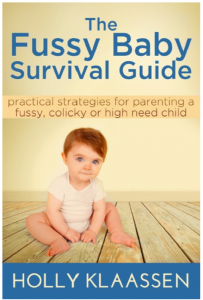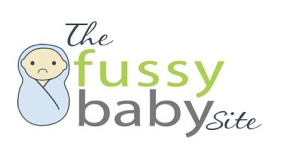- You are here:
- Home »
- Blog »
- High Need Babies »
- What Makes A Baby High Need?
What Makes A Baby High Need?

This is a question that many parents of high need babies struggle with. They want to understand why their child is so fussy, discontent and unpredictable. They think that if they can pin down the cause, it will somehow make life more manageable.
I think this is a natural tendency, and is just part of human nature. When something bad or hard happens to us, we feel driven to find a reason or cause that makes sense to us. That maybe, somehow, finding a valid reason will make all our suffering worthwhile.
For parents of very fussy babies, there’s often an additional element. Knowing the cause of the fussiness means you can pursue treatment and potentially “fix” the fussiness. Or at the very least, you can come up with ways to manage it.
On their quest to find out what could have made their baby this way, many parents wonder:
- Could a stressful pregnancy or delivery have caused my baby to be so fussy?
- Does taking antidepressants whiles pregnant cause colic or fussiness?
- Is my baby fussy because I had a C-section?
- Did I cause this because I chose to give formula rather than breastfeeding?
In a survey I sent around last year, I asked parents of high need kids some of these same questions (among others). I’ve included responses to two of these questions below. Keep in mind, this is not a valid scientific study. However, I believe you’ll find the answers interesting, nonetheless.
Does type of birth impact fussiness?
(Click to enlarge image)
Just over half (55%) of respondents reported having an uncomplicated vaginal delivery, while an additional 11.5% had a vaginal delivery requiring assistance (forceps, vaccum, etc.). Approximately 30% had c-sections. This is right in line with the CDC’s National Vital Statistics report which cited the overall c-section rate in the US in 2014 at 32.2%. This suggests that high need babies aren’t high need due to the type of birth.
Does a negative or stressful pregnancy or birth experience, or using antidepressents lead to having a high need baby?
Over the years many parents have asked me whether a particularly stressful pregnancy or birth could have caused their baby’s fussiness. I have heard from parents who have gone through terrible circumstances during pregnancy: the death of a loved one, a major accident or illness, or other types of extreme physical and emotional stress. While I can’t say without doubt that this never contributes to infant fussiness, the results of this survey seem to indicate that a stressful pregnancy or birth does not lead to having a high need child.
Among the various options given in the survey, a traumatic birth experience had the highest incidence at 30%, followed by 27% for extreme stress during pregnancy.
Keep in mind that approximately 40% of respondents answered this question ‘no’ or left it blank (meaning they did not experience any of these).
The percentages among all 1,400+ respondents were as follows:
- 10% said they experienced a traumatic event or serious illness during pregnancy
- 30% indicated that they had a traumatic birth experience
- 27% said they experienced extreme stress during pregnancy
- 8% said their baby had a NICU stay
- 8% indicated taking antidepressants or anti-anxiety meds while pregnant
When it’s time to let go of looking for a cause
Again, I think it’s natural to work through some of these questions, especially if they’re consistently causing feelings of guilt or doubt.
However, what I often see are parents getting stuck at this stage for many months (or years). They feel like something they’ve done MUST have caused the fussiness, and they can’t seem to let go and move on.
When you have a very young baby who is fussy much of the time, I think this is a very healthy process. There are a number of conditions that can look like high needs, like reflux, lip/tongue-tie or a food allergy or sensitivity. If your gut tells you there’s something else going on with your baby, it’s vital that you talk about your concerns with your doctor.
When this questioning may start to become less helpful is when the doctor has ruled out any physical cause.
In my experience, constantly asking “why” at this stage can have an unfortunate consequence.
In their constant quest for a cause, parents can lose sight of what’s in front of them: a beautiful, healthy (if demanding!) child who needs mom or dad to see him for who he is.
In some cases, parents may even begin to medicalize their child’s behaviors. Instead of seeing their child’s persistence, intensity or sensitivity as unique personality traits, they may start to believe these traits are pathological – that they’re perhaps red flags pointing to a medical problem.
But perhaps the biggest and most harmful consequence is this: parents are unable to let go of what they hoped for, and to accept what is.
If your baby or toddler is truly high need or “spirited”, they were born this way*. All the behaviors we find so challenging – the crying, the grumpiness, the unpredictability – are simply early manifestations of his or her personality.
*Kids with colic, reflux, an allergy, etc. can exhibit many of the same behaviors, but wouldn’t be considered “high need” in the truest sense of the word. High need was a term defined by Dr. Sears to describe a certain set of personality traits.
While there are ways we can adapt our parenting to help our high need child, I believe there’s something even more important that can help turn the tide in our parenting journey.
In my experience (and I’ve heard this from countless parents), the moment we accept that our child is just who he is supposed to be, is the moment things start to become easier.
Instead of constantly asking why and trying to find a cure for the fussiness, we start to appreciate our child for who she is; or at the very least, we stop beating ourselves up for not being able to “fix” her.
It allows us to let go of the “shoulds” – She “should be sleeping through the night”; He “should” be happy; I “should” know what’s wrong with my child – and instead deal with what IS.
I know this isn’t an easy thing. But if you’re able to do it, you just might be surprised at the level of peace and freedom it brings you.
 If you’re looking for more answers and guidance regarding your high need or fussy child, you might be interested in my new ebook, The Fussy Baby Survival Guide. It’s jam-packed with information, strategies, stories and the full results of two surveys I’ve done of parents of high need babies. It answers questions like:
If you’re looking for more answers and guidance regarding your high need or fussy child, you might be interested in my new ebook, The Fussy Baby Survival Guide. It’s jam-packed with information, strategies, stories and the full results of two surveys I’ve done of parents of high need babies. It answers questions like:
- How do I know if my baby is colicky, high need, or something else entirely?
- Will my high need baby ever get easier? And if so, WHEN?
- Is “high need” a real thing? Is there any research to back it up?
- What are the most effective strategies for helping my high need baby sleep?
- How do I deal with my child’s INTENSE tantrums?
For more info or to grab your copy now, click here!
Other Posts You May Like
What to Do About Sibling Fighting
The Fussy Baby Site Goes to Facebook HQ!
How to Raise a Dragon Baby
Stop Crying, Calm Down, and Other Things We Tell Our High Need Kids
Research On High Need Babies [Fact Sheet]
What Is A High Need Baby?

